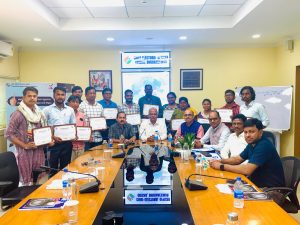Experts say that the current heatwave in South Asia is much more severe due to the ongoing climate crisis, which has increased the likelihood of such extreme weather events by 45 times.
Food stall in Bhubaneswar, India closed due to 17-day heatwave, the longest since 1969, causing health and livelihood troubles for locals.

Annu Mishra, a 51-year-old street vendor in Bhubaneswar, Odisha, had to make a tough decision in April as temperatures soared above 40 degrees Celsius for 17 days straight. She was forced to close her modest food stall, as the scorching heat made it nearly impossible to stand near the gas stove. This was the longest heatwave streak since 1969, and it severely impacted the health and livelihoods of many others like Mishra.
Mishra recalled that the only other time her stall had remained shut for such a long duration was during the devastating Cyclone Fani in 2019. But this time, it wasn't a natural disaster causing the unbearable heat, but rather the effects of climate change. According to a group of leading climate scientists, heatwaves of similar intensity could occur once every 30 years, and they have already become 45 times more likely due to the changing climate.
The team of scientists, known as the World Weather Attribution group, pointed out that the intensification of heatwaves due to climate change is making life extremely challenging for people living in poverty across Asia. In April, with a weakening El Nino and the increasing concentration of heat-trapping greenhouse gases in the atmosphere, millions of people in South Asia had to endure brutal heat. In India alone, record-smashing maximum temperatures were recorded, prompting health warnings and even the suspension of in-person classes in schools.
But India was not the only country affected by the oppressive heat. The Philippines, Bangladesh, Indonesia, Malaysia, and Myanmar also experienced record-breaking temperatures. In West Asia, including countries like Syria, Lebanon, Israel, Palestine, and Jordan, heatwaves with temperatures above 40 degrees Celsius have become more frequent due to climate change. And as global average temperatures continue to rise, scientists predict that this region will experience similar heatwaves once every 10 years, and even more frequently if the warming reaches 2 degrees Celsius.
Apart from the obvious health risks, heatwaves can also have a significant impact on economies. People are less productive during hot weather, and children struggle to focus and learn in extreme heat. Mishra, for example, suffered a loss of Rs 20,000 due to keeping her food stall shut during the prolonged heatwave spell. She also witnessed other street vendors facing massive losses and even heatstroke as they were allowed to sell their products only during limited hours in the morning and evening.
Experts suggest that special attention needs to be given to the elderly and children, who are particularly vulnerable to heat exhaustion and heatstroke. Vishwas Chitale, senior program lead at the Council on Energy Environment and Water, emphasized the need for Indian cities to identify and prepare for vulnerable populations promptly. While some countries, like India, have comprehensive heat action plans in place, they need to be expanded to include mandatory regulations for workplace interventions to address heat stress.
In conclusion, the recent heatwave in Bhubaneswar and other parts of Asia serves as a stark reminder of the urgent need to address the effects of climate change. It not only impacts the environment but also has a significant impact on the health and livelihoods of individuals, particularly those living in poverty. As responsible citizens, it is crucial to take action and support initiatives that aim to mitigate the effects of climate change and protect the most vulnerable in our society.










